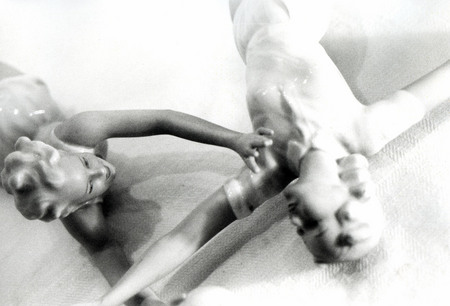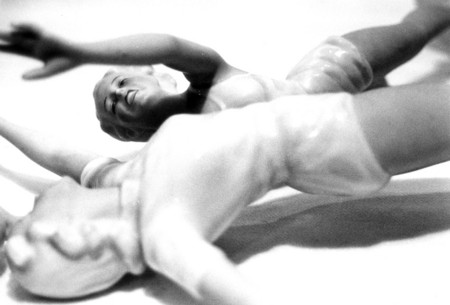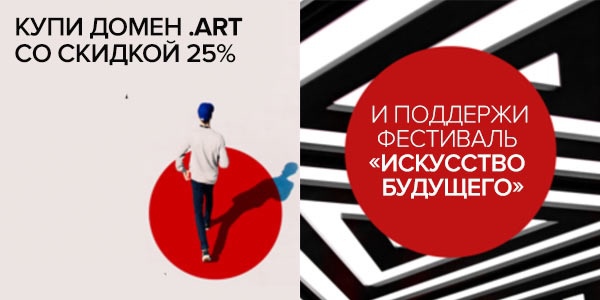Lili Marlen
Moscow, 19.03.2005—15.04.2005
exhibition is over
Aidan Gallery
1st Tverskaya - Yamskaya st., 22
Share with friends
For the press
«I saw these statuettes at a friend’s place. Beautiful and cold. Approachable and inaccessible. These are German ladies. They go well with sports, austere military costume and Lesbian caresses. Let them dance and embrace each other. I instantly heard the heady «Lili Marlen» in my mind».
Oleg Artiushkov
The decorative and applied art of totalitarian regimes sometimes fits surprisingly well into the context of contemporary art forms. The usage of cliche, of strictly fixed codes creates a new, alienated aesthetic. One cannot manipulate the inertia of everyday life. But the epoch of porcelain sportswomen has already become a myth, and domestic objects of those days are now tinged with the poetry of memory. They presently appear as messengers of the past, and before our very eyes light and shade sculptures completely new forms out of them. A girl with a perfect body, a girl doing sports, a girl that is all-powerful. A figure frozen in the porcelain numbness. Her smile, eyes and gestures express the coldness of a stereotype. Being one among a hundred copies, it decorates a sideboard belonging to a pair of sixty, while another one was inherited by the artist’s friend. The phenomenon of this cliche, of this lacquered emotionality, which gave birth to clumsy dolls, is transformed by the subjective sight of the artist into a particular message. The impression of being unfinished and odd that these statuettes leave creates a certain frontier zone, which opens up opportunities for new interpretations.
There are only two personages represented in this photo-series — two statuettes. But every other shot will not appear to you as a copy of the preceding one. The heroines lose their balance, their superhuman stability. They fall down, reach out for the spectator, they fly up. Like real models they can assume an air of sadness and haughtiness, or even appear horror-stricken, while at other times radiate a sense of quite, steady happiness, like genuine German ladies. They might seem to you barely alive, only just slowly awakening from their petrified state. The eye of the photographer will convey a new combination of emotions, stolen from the doll. Frozen emotions that it never expected to exist, while it was doing its exercise — outstretching arms. Delicate changes of light and shade, thin lines, mysterious blurred background — a new world, a world of inter-subjectivity; there is no ideology or propaganda, only a hazy recollection of history. Only sadness, a delicate profile, lines of arms and shoulders, blond curls... The voice of Marlen coming from an old, rustling album...
Pygmalion brought life to the «shining white ivory» with his hands, inspired by love for a woman which never existed upon the face of the Earth. Oleg Artiushkov brought life to figures that had been doomed to banality, that, with all their movement, never seemed alive. Figures that used to decorate the most ordinary and simple interiors, like curtain lace. Artiushkov’s works reflect the faith in the myth of beauty, which will last forever, independent of time and history. Beauty which is wrapped in sadness and is eternally slipping away. The artist’s visions are ephemeral, fleeting and elusive. There is an impression that only owing to the speed with which film absorbs light we can sense these ever changing, unstable images, fixed by the artist. «Beauty — is infinity in the finite». (F. Shelling)
Lidia Petrova




